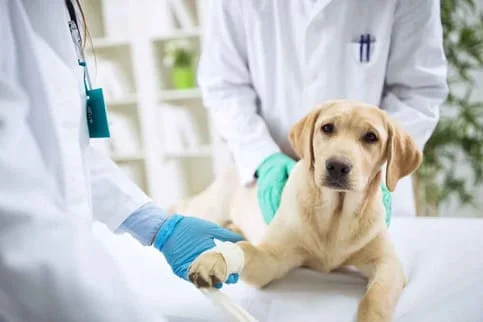Cruciate Ligament Repair with Our Orthopedic Veterinarian in Omaha
Sirius Veterinary Orthopedic Center is a premier orthopedic veterinary clinic in Omaha that helps dogs and cats of all breeds, sizes, and ages recover from a variety of joint-related problems, including one of the most commonly diagnosed conditions: cranial cruciate disease.

Our Orthopedic Veterinarian in Omaha Explains Cranial Cruciate Disease
Have you ever heard of the stifle joint? In dogs, it's analogous to the human knee joint and is located in the middle of the two rear legs. One of the main tissues that stabilize this joint is the cranial cruciate ligament (similar to the ACL in human knees). Damage to this ligament is one of the most common causes of limping, lameness, pain, and knee arthritis in dogs. Because it disrupts the normal stability and alignment of the knee, a cranial cruciate ligament tear can also increase your dog's risk of sustaining a meniscal tear and arthritis.
Your dog may be at risk for developing the cranial cruciate disease if it has any of the following known risk factors: advancing age, genetic predisposition, poor physical vitality and conditioning, obesity, and abnormal joint alignment (such a hip dysplasia). Certain breeds are also more at risk, including Boxers, Labrador Retrievers, Rottweilers, Huskies, Saint Bernards, and Akitas.
Signs & Symptoms of a Torn Cranial Cruciate Ligament
Unlike an ACL injury in humans--which tend to occur due to acute trauma--the cranial cruciate ligament almost always becomes damaged in a slow and progressive nature. If your dog develops
- Difficulty getting up off the floor
- Limping
- Difficulty getting into or out of a car, or climbing stairs
- Decreased interest in/tolerance of physical activity
- Muscle weakening and atrophy in the affected leg
- Decreased range of motion and stiffness in the affected knee
- An audible popping or clicking sound in the affected knee
What Happens During a Ruptured Cranial Cruciate Ligament Dog Surgery
Often times, conservative techniques including medication, rest, and nutritional changes are not enough to help a dog heal from a torn cranial cruciate ligament injury. In these cases, our orthopedic veterinarian in Omaha may recommend a ruptured cranial cruciate ligament dog surgery.
There are several surgical approaches that the orthopedic vet team can take to manage a cranial cruciate ligament tear. These include bone cutting techniques (especially preferred for larger and active dogs) and suture-based techniques. The goal of any approach is to permanently restore the alignment and stability of your dog's knee.
How to Manage Your Animal's CCL Recovery after Surgery
In the vast majority of cases, the prognosis is excellent for dogs that have had a ruptured cranial cruciate ligament repair. It is extremely important that you monitor and limit your dog's activity in the period immediately following surgery. This is to ensure that the surgical intervention is effective and no damage or infection occurs. Our Omaha orthopedic vet team will give you specific instructions to help you keep your dog comfortable and safe throughout its rehabilitation and recovery period.
Is Your Dog Suffering From Cranial Cruciate Disease Or Other Injury? Consult With Our Orthopedic Veterinary Team in Omaha
If you have been looking for an orthopedic veterinarian to help with your four-legged athlete's health needs then call Sirius Veterinary Orthopedic Center today to schedule a consultation. The Sirius Veterinary Orthopedic Team will provide the most appropriate diagnostic and therapeutic treatment plan based on your animal's condition, such as the management of the cranial cruciate disease. To learn more, contact us at 402-934-1332.
